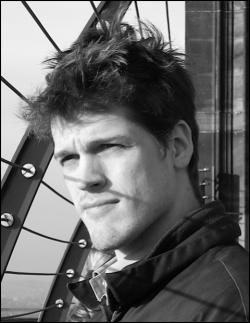 David Adamcyk completed his Doctor of Music degree in Performance and Composition, culminating in Cheval mémoire, a thirty-minute musical composition scored for solo piano, electronics, and six antique radios. The program at McGill was a combination of amazing teachers and facilities; his supervisors and mentors were encouraging, and David felt he had the freedom to do what he wanted and needed to do in his degree. He was also close to the Digital Composition Studio and Music Technology departments, and often collaborated with performers from the Contemporary Music Ensemble.
David Adamcyk completed his Doctor of Music degree in Performance and Composition, culminating in Cheval mémoire, a thirty-minute musical composition scored for solo piano, electronics, and six antique radios. The program at McGill was a combination of amazing teachers and facilities; his supervisors and mentors were encouraging, and David felt he had the freedom to do what he wanted and needed to do in his degree. He was also close to the Digital Composition Studio and Music Technology departments, and often collaborated with performers from the Contemporary Music Ensemble.
David completed his degree in six years, which felt like the right amount of time. He was involved in projects which may have delayed his completion (such as Ircam’s composition cursus in Paris), but were valuable experiences. Although his early years were funded, later years were tight; commissions for new compositions from the Canada Council and other freelance work helped financially.
After completing his degree, David moved to New York, and he is now an adjunct professor at Columbia University, as well as on faculty at and Director of the Electronic Studio at Manhattan School of Music. He also freelances as a music and sound engineer for contemporary music ensembles, which was a side project at McGill, but, in New York, provides the bulk of his income.
David’s experiences during his program provided the foundation for his work now; reflecting on his experience, he notes that “I just refined things after [my DMus]. Everything I do now is an extension of what I learned at McGill.” David also acknowledges that his experience may not have been everyone’s experience, since he previously completed his Bachelor’s and Master’s degrees at McGill and consequently was very familiar with how to navigate the school’s system. In hindsight, more opportunities to teach would have been beneficial, and he would have liked to have focused more on sound recording, and perhaps gotten credentials. Now that he has his own students, David advises them that electronic music has a lot of potential, and is an exciting and practical way into the working world as a composer.
 David Adamcyk completed his Doctor of Music degree in Performance and Composition, culminating in Cheval mémoire, a thirty-minute musical composition scored for solo piano, electronics, and six antique radios. The program at McGill was a combination of amazing teachers and facilities; his supervisors and mentors were encouraging, and David felt he had the freedom to do what he wanted and needed to do in his degree. He was also close to the Digital Composition Studio and Music Technology departments, and often collaborated with performers from the Contemporary Music Ensemble.
David Adamcyk completed his Doctor of Music degree in Performance and Composition, culminating in Cheval mémoire, a thirty-minute musical composition scored for solo piano, electronics, and six antique radios. The program at McGill was a combination of amazing teachers and facilities; his supervisors and mentors were encouraging, and David felt he had the freedom to do what he wanted and needed to do in his degree. He was also close to the Digital Composition Studio and Music Technology departments, and often collaborated with performers from the Contemporary Music Ensemble.
David completed his degree in six years, which felt like the right amount of time. He was involved in projects which may have delayed his completion (such as Ircam’s composition cursus in Paris), but were valuable experiences. Although his early years were funded, later years were tight; commissions for new compositions from the Canada Council and other freelance work helped financially.
After completing his degree, David moved to New York, and he is now an adjunct professor at Columbia University, as well as on faculty at and Director of the Electronic Studio at Manhattan School of Music. He also freelances as a music and sound engineer for contemporary music ensembles, which was a side project at McGill, but, in New York, provides the bulk of his income.
David’s experiences during his program provided the foundation for his work now; reflecting on his experience, he notes that “I just refined things after [my DMus]. Everything I do now is an extension of what I learned at McGill.” David also acknowledges that his experience may not have been everyone’s experience, since he previously completed his Bachelor’s and Master’s degrees at McGill and consequently was very familiar with how to navigate the school’s system. In hindsight, more opportunities to teach would have been beneficial, and he would have liked to have focused more on sound recording, and perhaps gotten credentials. Now that he has his own students, David advises them that electronic music has a lot of potential, and is an exciting and practical way into the working world as a composer.
Discussion